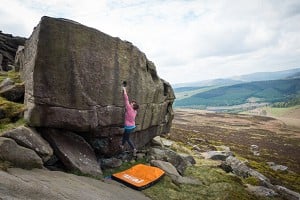
Grandly named 'Devonia's Alps' by celebrated author William Crossing, Dartmoor is formed by the largest mass of granite in Britain, is very peaty and has a lot of bogs. Of more interest for us, however, is that over the last 30 years it has matured from being a relative backwater frequented mostly by tough-skinned locals into an outstanding bouldering destination, appealing to climbers of all levels, from novice to world class.
Whether you want to feel small in the grandiose landscapes of the open moors or embraced by a comforting olde woodland, you will find a venue to suit.
Visitors to the area should be warned that it does have its own 'gravity anomaly' - if you find something hard it is no doubt due to the massive lump of granite under your feet.
The following areas and crags, and a lot more besides, are detailed in the new Devon Bouldering Rockfax guide.
Haytor Area
The Haytor area provides a high concentration of bouldering at varied, convenient venues and is home to the most popular crags on Dartmoor.
Hound Tor
It's easy to argue that Hound Tor has the best spread of lower to middle grade bouldering on Dartmoor…because it has! I have always loved uninterrupted climbing on relatively easier ground and this tor, with its abundant problems in the Font 3-6B range, is perfect for that.
Those in search of something a little sterner are also catered for with the likes of Wish (f6C), Stray Puppy (f8A), Alan Smith (f7C) and The Cream Traverse (f7A+).
Hayne Down
Located a short distance from Hound Tor, this broad hilltop is home to a good selection of easier problems in the 3-6A range as well as a smattering of harder lines. Despite having been climbed on for many years, it has only now been properly documented in the Devon Bouldering Rockfax guide.
Black Hill Boulders
This peaceful hillside is home to a smallish selection of good, diverse and interesting problems with the bonus of remaining quieter than most other crags in the area. It is easily incorporated into a trip to Smallacombe Rocks to make a big day out.
Smallacombe Rocks
A vast smorgasbord of bouldering strewn across a hillside in a beautiful setting. I've always found it best as a venue for questing around mid-grade circuits although the easily approached Orphan Block, with its concentration of harder problems from 6A to 7C, will appeal to those who want to focus on one steep bit of rock. A special mention must be made of Commitment Issues (f8A); whilst this is unlikely to be of mass appeal due to its highball nature, the line is well worth a look at just for inspiration.
Holwell Tor
Found not far from Smallacombe Rocks and easily combined with a visit there, this crag is not as extensive but does have some real quality, much of which has only been developed in recent years. Outstanding problems include the impending line of Right to Roam (f8A), Schmogon (f7B+), Hanging Fruit (f7B) (originally 8A) and flummoxing delight of Tim the Enchanted 6A. Those with a penchant for highball action will be entertained by Dogon (f6B)—a spicy, gritstone-esque mini-route.
Saddle Tor
Possibly the best venue on the moor for high quality, harder problems. The Bulging Face is home to multiple outstanding and 'memorable' (i.e. high!) problems ranging from 5 to 8B. These include the Dartmoor classics, working up through the grades, of Mezzotinter (f5), Bjorn Again (f6A), Dancing Queen (f7B), Super Trouper (f7C) and The Winner Takes It All (f8B). Despite its hilltop location, the crag can remain remarkably sheltered from northerly winds. Although not actually at Saddle Tor, the nearby Emsworthy Rocks is well worth wandering over to for its half a dozen or so problems in the 5-6C range.
Tunhill Rocks
A relaxing spot with a splendid outlook over the East Webburn Valley. It has a handful of varied problems spread around the plateau and hillside below, the most noteworthy being the 6B-6C problems on the Power Boulder.
Bonehill Rocks
A lifetime's worth of varied test-pieces, a lofty vantage point, sublime sunsets, a sub one-minute walk-in and five-minute drive to The Rugglestone pub for a post-boulder drink—what's not to like? These attributes have led to the crag becoming the most popular bouldering destination on Dartmoor and it is possibly that fact that provides the only drawback. The concentrated and user-friendly bouldering here caters for everyone with grades ranging from 2 to 8B. The stunning Wave feature is one of the most impressive on the moor and has proven to be very fertile ground for hard problems and countless link-ups.
Bell Tor
Conveniently located a five-minute walk from Bonehill, this small crag has a handful of good and some really good problems, the best of the bunch probably being Famous Grouse (f7A) (with its memorably rounded finish!) and the Beau Wall (f6B).
Honeybag Tor
Despite its proximity to Bonehill, this extensive tor never sees anywhere near the same attention and is well worth escaping to if you're after some peace and quiet in yet another impressive setting. With panoramic views, a really good selection of problems from 3 to 7C (with most being in the middle of that range) and sunny/shady options to suit most conditions this tor has a lot going for it.
East Dartmoor
The eastern fringes of the moor, with their maze of narrow lanes, provide a complete contrast to the open moorland crags to the west. The crags here are pretty much entirely nestled within woodlands, sheltered from cold winds, and home to a few lifetime's worth of exploration.
Bovey Woods
The extensive woodlands around Shaptor, Rock Copse, Stonelands and Bearacleave are collectively known, to climbers, as the Bovey Woods. This area has been developed since the early 00s and is now home to hundreds of problems across the grades. The woods are a beautiful and tranquil spot to climb in although it is really best suited to those operating above 5+, or harder (up to 8A) and the bouldering is not always the most user-friendly with challenges coming from moss, gritty rock and ants! However, there are countless classics amongst which the most sought after is possibly Devon Sent (f7C+), a delicate line that traces its technical passage up one of the most impressive boulders around. A mention must be made of the current relationship with the landowners, The Woodland and National Trusts, which has been sensitive in recent years as the area has risen in popularity. Suffice it to say, please avoid being noisy, cleaning, dodgy looking night-time visits, littering, inconsiderate parking, over chalking etc. etc.
Lustleigh Cleave
This magical area contains some of the best rock on the moor and is a sublime place to boulder. There is a wide spread of grades from 3 up to about 7C+. The Cleave contains various venues, each with a slightly different character, although some problems can get slightly mossy after a spell of being under-climbed.
Burrator Area
The Plymouth, or 'janner', side of the moor is less popular from a bouldering point of view but this is not due to lack of quality. There are a handful of good crags with Cuckoo Rock and Combeshead Tor area containing some of the best problems in the West Country.
Cuckoo Rock and Combeshead Tor
Quintessential Dartmoor - remote, rugged, wild and beautiful. The proud, independent problems here take proper, high and pure lines without the distraction of rules about what's 'in' and what's 'out'. It's hard to pick out the best problems as there is so much quality but Sharp Arête (f5+), Traverse and Slab (f6A), Hanging Flakes (f6B), Flake Crack Dyno from Undercuts (f7A) and Proof of Concept (f6C) are all outstanding and those with a decent wingspan should seek out Side Effects (f7C+), yet another excellent line.
Down Tor
Combeshead Tor's younger sibling (in that its bouldering was developed more recently) provides a greater selection of problems in the lower grades than its big brother. Whilst the quality is also a bit lower, the tor has stunning views and a shorter approach making it well worth a visit in its own right or in combination with Combeshead Tor.
Burrator Boulders
Nestled in the woods just below Burrator Reservoir, this small but fun spot has a handful of worthwhile problems ranging from 2 to 8A+. Jungle V.I.P. (f7C+) has become one of the more popular of Dartmoor's harder lines thanks to its being fairly low and not too technical. The area takes only a few minutes to walk to and is very sheltered, making it well worth a look if you get weathered off the nearby moorland crags.
Upper Dart Valley
From a boulderers' perspective, this is an unusual and esoteric part of the moor with some varied, mostly very accessible crags and impressive scenery. Starting up on the high moor are Bittaford and Lettaford Tors with their very limited bouldering in a wild, remote setting. Moving down the catchment area are the crags of the Upper Dart valley; Combestone Tor, an ideal picnic spot right next to the road with a small circuit of problems in the 3-5+ range; Bench Tor with its handful of tough roof problems and long traverses around 7B-8A (and a few easier but inferior problems); Mel Tor with a collection of lines from 3-6B. A little further downstream again the rock has been cooked and heated into some some funky compact stuff; here resides the small but interesting Leigh Tor (super accessible, limited bouldering, the best of which is around 7B) and the Lothlórienesque Ausewell Rocks with its ten or so steep and usually dry problems from 4 to 6C.
Chagford Area
This largely forgotten, hidden quarter of the moor contains the smallest amount of bouldering described in this article. The main event, Gidleigh Rocks, is well worth a visit; ensconced within a pine forest, the boulders here provide a wide range of problems with an unusual feel to them. The rock is mostly good and the location well sheltered from the wind and even sometimes the rain. If you're in the area, the small roof at Middle Tor is also worth a stop, particularly on a hot summer's day—it has pretty straightforward access and a small number of fun, steep problems.
North Moors
The bleak, wild and remote plateau of the northern moor has an appeal that transcends that of purely hardcore bouldering. Long walk-ins, bog snorkelling and widely dispersed problems are de rigueur. The most convenient spot is probably Sourton Tors with its 15 minute approach; the bouldering here is pretty limited but Lip Trip (the problem formerly known as Sourton Traverse) 7B is the stand out problem and worth walking up the hill to reach it. Fur Tor, with its two-hour approach, is home to the most remote bouldering in the south west and an ideal venue for the trail-running boulderer - the problems are limited but everyone should make the effort to visit (once). Other crags in the area are less notable but still merit a visit for the sake of exploration.
Have fun and remember that on many of the Moor's problems a bad foothold in the right place can be better than a good foothold in the wrong place!
- REVIEW: Dorset Bouldering Rockfax 22 Jul, 2015
- The Climbers' Club Portland Guidebook 30 Sep, 2008
Guidebook
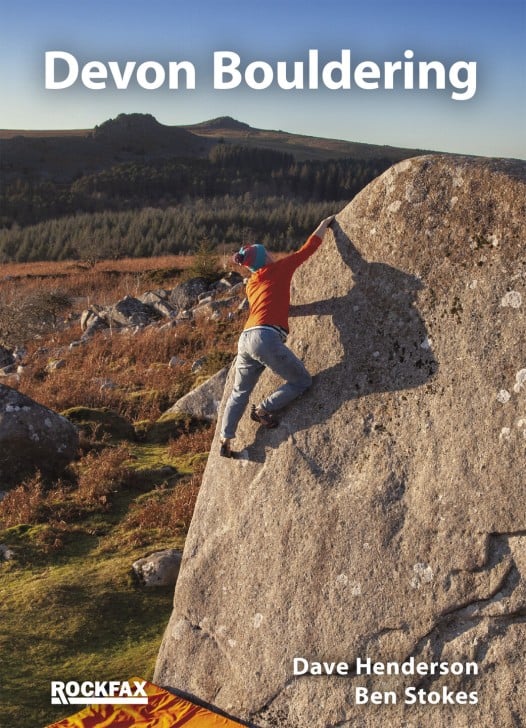
Devon Bouldering
Extensive coverage of bouldering of the moors, tors and woods of Devon. Produced in familiar Rockfax style with detailed photo topos, maps and overviews and lots of action photos. Also available on Rockfax Digital with extra areas.
More info
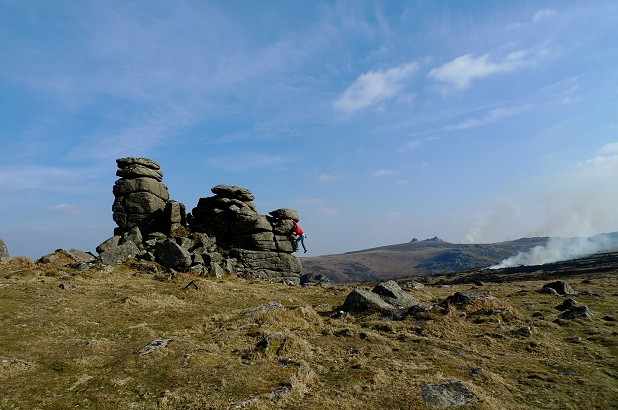
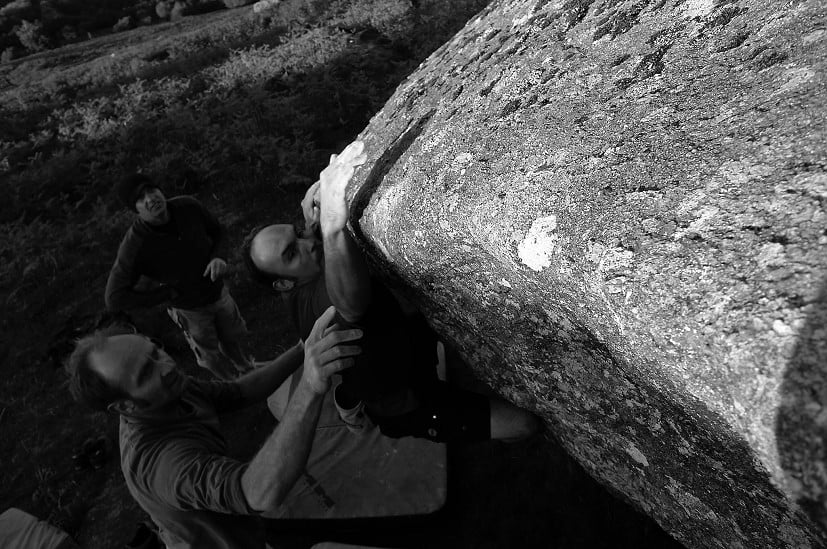
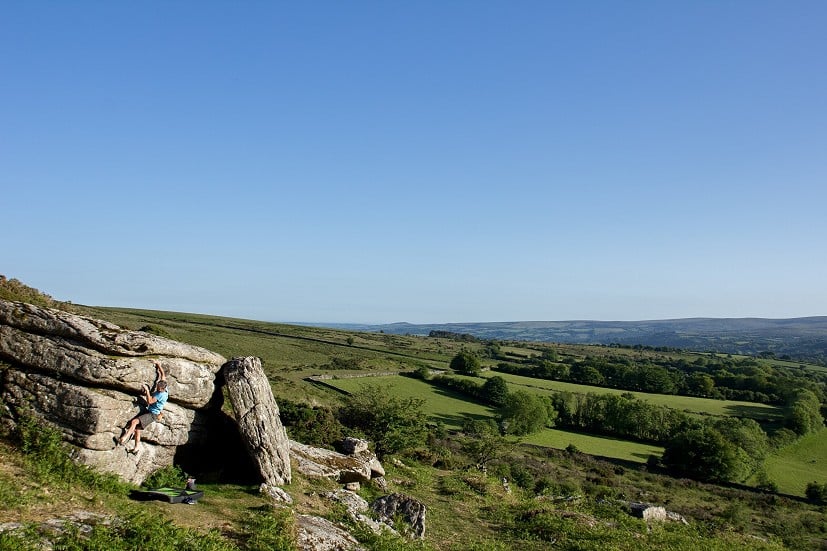
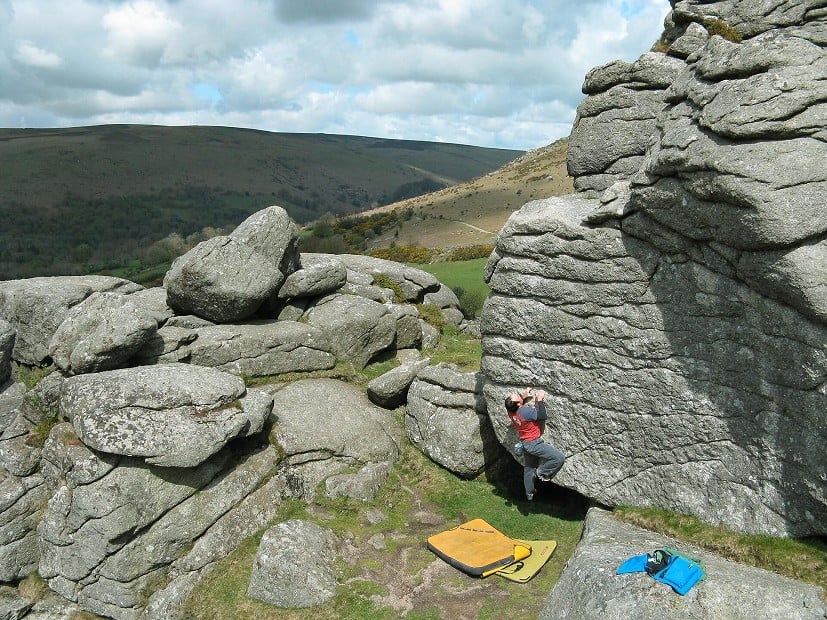
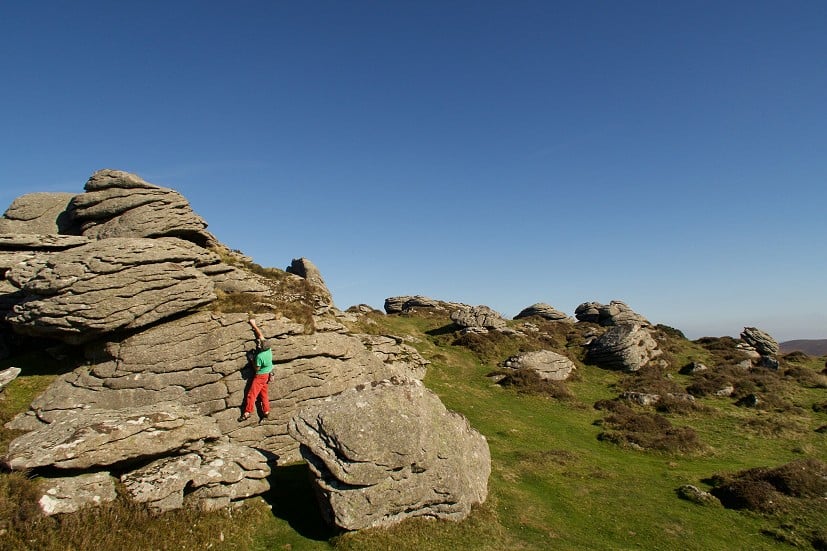
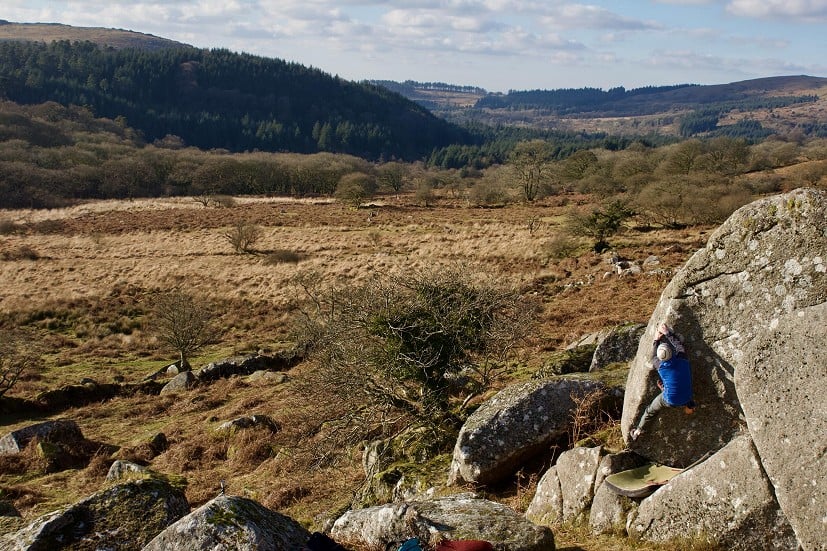
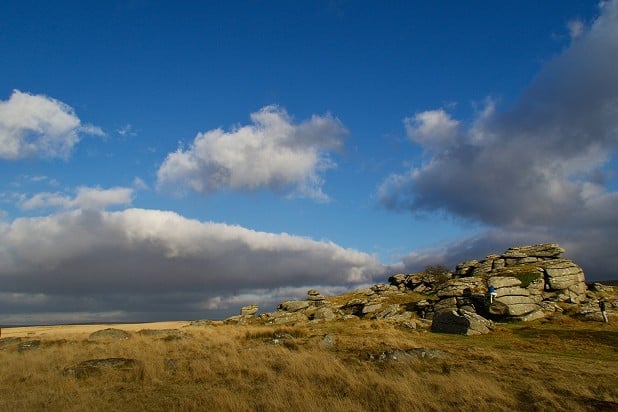
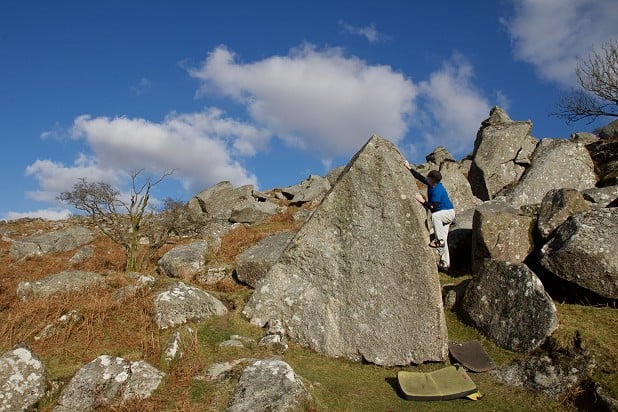
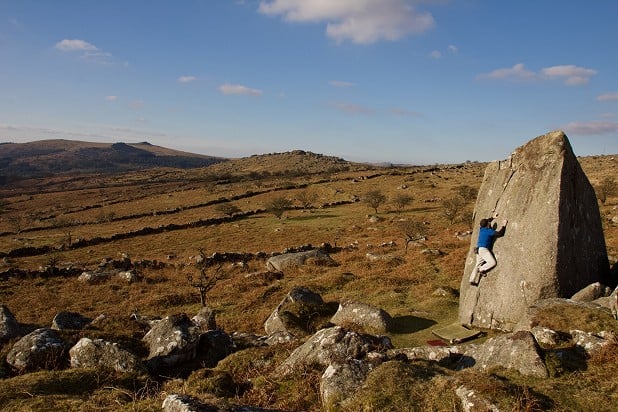
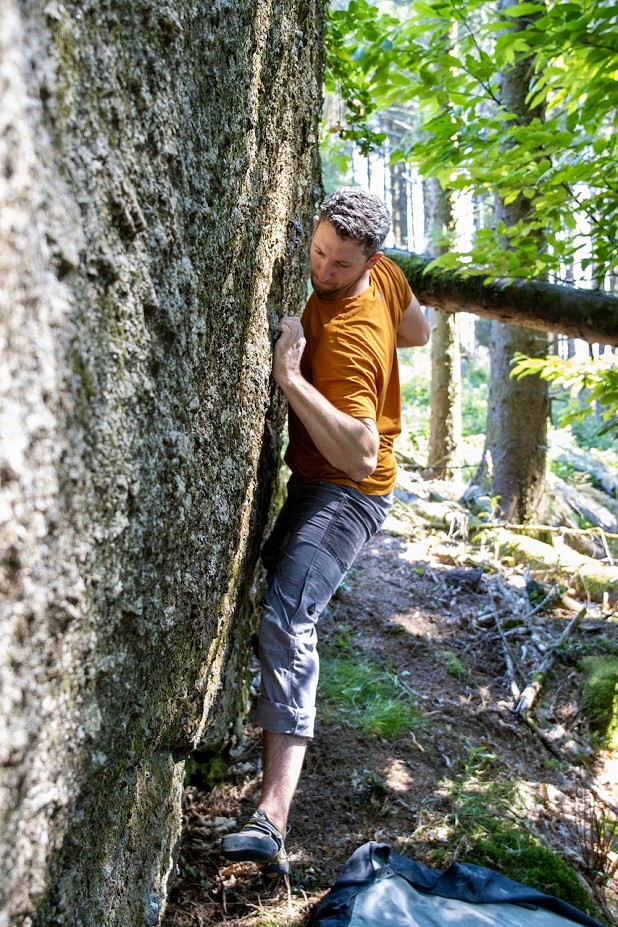
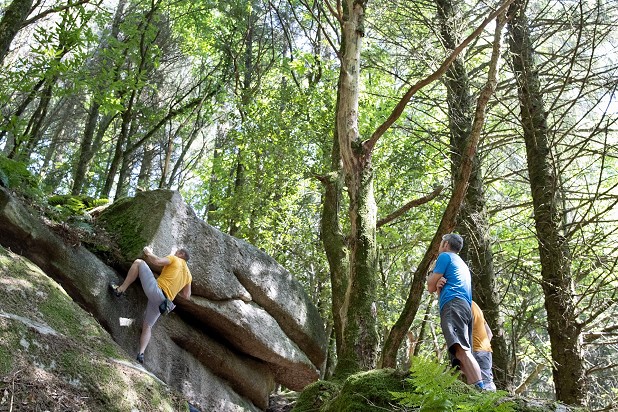
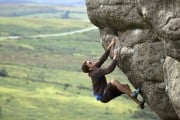
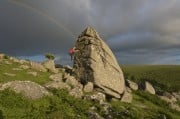
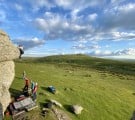
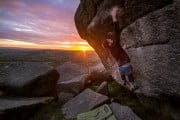
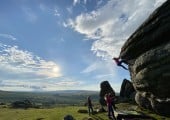







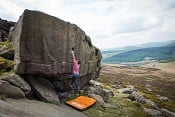
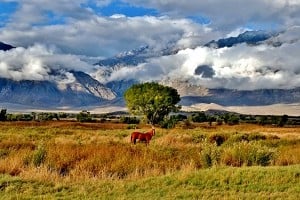
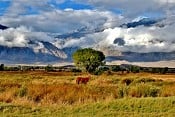
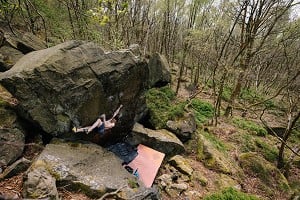
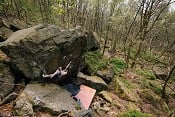



Comments
Great to see this come out! I moved to the area in 2019, climbed with Perry a few times and been hearing about the potential for this book to arrive since then. Great to see dartmoor getting some attention, very well done.
excited to get my copy.
paddy
In reply to UKC Articles
Geddon!!! Such a savage yet great area Dartmoor granite! Cut my teeth there as a youngster and always enjoy heading back for the inevitable spanking… like at the weekend when I went for a long awaited second session on Nether Edge… suffice to say no summit obtained before the obligatory blood was spilt!
Great stuff Dave - I’m looking forward to getting my bloodied stumps on it at some point!